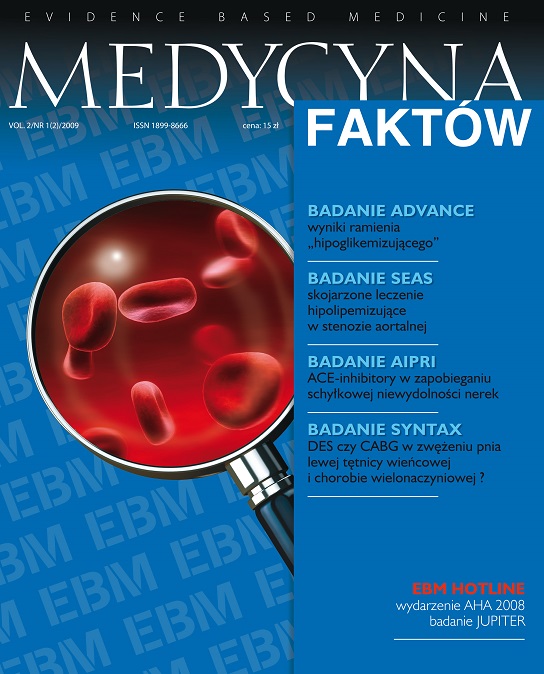Badanie AIPRI – jak hamować postęp nefropatii niecukrzycowej? Artykuł przeglądowy
##plugins.themes.bootstrap3.article.main##
Abstrakt
Farmakologiczne hamowanie układu renina-angiotensyna-aldosteron stanowi przełom w leczeniu pacjentów z przewlekłą chorobą nerek i z białkomoczem. Istotą badania AIPRI była ocena skuteczności i bezpieczeństwa leczenia inhibitorem konwertazy angiotensyny, benazeprilem, u chorych w stadium 3. i 4. PChN (średnie stężenie kreatyniny w surowicy 184 μmol/l). U chorych z nefropatią niecukrzycową i z umiarkowanym białkomoczem zastosowanie benazeprilu w dawce 10 mg/dobę przez 3 lata pozwala zmniejszyć ryzyko wystąpienia schyłkowej niewydolności nerek i opóźnia jej wystąpienie w porównaniu ze stosowaniem placebo.
##plugins.themes.bootstrap3.article.details##
Jak cytować
Małecki , R. (2009). Badanie AIPRI – jak hamować postęp nefropatii niecukrzycowej? . Medycyna Faktów , 2(1(2), 45-50. Pobrano z https://journalsmededu.pl/index.php/jebm/article/view/2681
Numer
Dział
Artykuły
Copyright © by Medical Education. All rights reserved.
Bibliografia
1. Campbell R.C., Ruggenenti P., Remuzzi G.: Halting the progression of chronic nephropathy. J. Am. Soc. Nephrol. 2002; 13: 190-5.
2. Wolf G., Butzmann U., Wenzel U.O.: The renin-angiotensin system and progression of renal disease: from hemodynamics to cell biology. Nephron. Physiol. 2003; 93: P3-13.
3. Anderson S., Rennke H.G., Brenner B.W.: Therapeutic advantage of converting enzym inhibitors in arresting progressive renal disease associated with systemic hypertension in the rat. J. Clin. Invest. 1986; 77: 1993-2000.
4. Lewis E.J., Hunsicker L.G., Bain R.P. et al.: The effect of angiotensin-converting-enzyme inhibition on diabetic nephropathy. N. Engl. J. Med. 1993; 329: 1456-62.
5. Ruggenenti P., Fassi A., Ilieva A.P. et al. (for the Bergamo Nephrologic Diabetes Complications Trial (BENEDICT) Investigators): Preventing microalbuminuria in type 2 diabetes. N. Engl. J. Med. 2004; 351: 1941-51.
6. Maschio G., Alberti D., Janin G., Locatelli F., Mann J.F., Motolese M., Ponticelli C., Ritz E., Zucchelli P.: Effect of the angiotensin-converting-enzyme inhibitor benazepril on the progression of chronic renal insufficiency. The Angiotensin-Converting-Enzyme Inhibition in Progressive Renal Insufficiency Study Group. N. Engl. J. Med. 1996; 334(15): 939-945.
7. Locatelli F., Del Vecchio L.: How long can dialysis be postponed by low protein diet and ACE inhibitors? Nephrol. Dial. Transplant. 1999; 14: 1360-1364.
8. Ihle B.U. et al.: Angiotensin-converting enzyme inhibition in nondiabetic progressive renal insufficiency: a controlled double-blind trial. Am. J. Kidney Dis. 1996; 27: 489-495.
9. The GISEN Group: Randomized placebo-controlled trial of effect of ramipril on decline in glomerular filtration rate and risk of terminal renal failure in proteinuric, nondiabetic nephropathy. Lancet 1997; 349: 1857-63.
10. Jafar T.H. et al.: Angiotensin-converting enzyme inhibitors and progression of nondiabetic renal disease. A meta-analysis of patient-level data. Ann. Intern. Med. 2001; 135(2): 73-87.
11. Giatras I., Lau J., Levey A.S.: Effect of angiotensin-converting-enzyme inhibitors on the progression of non-diabetic renal disease: A meta-analysis. Ann. Intern. Med. 1997; 127: 337-345.
12. Hebert L.A.: Optimizing ACE-inhibitor therapy for chronic kidney disease. N. Engl. J. Med. 2006; 354: 189-191.
13. Bakris G.L., Weir M.R.: Angiotensin-converting enzyme inhibitor-associated elevations in serum creatinine. Is this a cause for concern? Arch. Intern. Med. 2000; 160: 685-93.
14. Rutkowski P., Tylicki L., Renke L. et al.: Low dual blockade of the renin-angiotensin system in patients with primary glomerulonephritis. Am. J. Kidney Dis. 2004; 43: 260-268.
2. Wolf G., Butzmann U., Wenzel U.O.: The renin-angiotensin system and progression of renal disease: from hemodynamics to cell biology. Nephron. Physiol. 2003; 93: P3-13.
3. Anderson S., Rennke H.G., Brenner B.W.: Therapeutic advantage of converting enzym inhibitors in arresting progressive renal disease associated with systemic hypertension in the rat. J. Clin. Invest. 1986; 77: 1993-2000.
4. Lewis E.J., Hunsicker L.G., Bain R.P. et al.: The effect of angiotensin-converting-enzyme inhibition on diabetic nephropathy. N. Engl. J. Med. 1993; 329: 1456-62.
5. Ruggenenti P., Fassi A., Ilieva A.P. et al. (for the Bergamo Nephrologic Diabetes Complications Trial (BENEDICT) Investigators): Preventing microalbuminuria in type 2 diabetes. N. Engl. J. Med. 2004; 351: 1941-51.
6. Maschio G., Alberti D., Janin G., Locatelli F., Mann J.F., Motolese M., Ponticelli C., Ritz E., Zucchelli P.: Effect of the angiotensin-converting-enzyme inhibitor benazepril on the progression of chronic renal insufficiency. The Angiotensin-Converting-Enzyme Inhibition in Progressive Renal Insufficiency Study Group. N. Engl. J. Med. 1996; 334(15): 939-945.
7. Locatelli F., Del Vecchio L.: How long can dialysis be postponed by low protein diet and ACE inhibitors? Nephrol. Dial. Transplant. 1999; 14: 1360-1364.
8. Ihle B.U. et al.: Angiotensin-converting enzyme inhibition in nondiabetic progressive renal insufficiency: a controlled double-blind trial. Am. J. Kidney Dis. 1996; 27: 489-495.
9. The GISEN Group: Randomized placebo-controlled trial of effect of ramipril on decline in glomerular filtration rate and risk of terminal renal failure in proteinuric, nondiabetic nephropathy. Lancet 1997; 349: 1857-63.
10. Jafar T.H. et al.: Angiotensin-converting enzyme inhibitors and progression of nondiabetic renal disease. A meta-analysis of patient-level data. Ann. Intern. Med. 2001; 135(2): 73-87.
11. Giatras I., Lau J., Levey A.S.: Effect of angiotensin-converting-enzyme inhibitors on the progression of non-diabetic renal disease: A meta-analysis. Ann. Intern. Med. 1997; 127: 337-345.
12. Hebert L.A.: Optimizing ACE-inhibitor therapy for chronic kidney disease. N. Engl. J. Med. 2006; 354: 189-191.
13. Bakris G.L., Weir M.R.: Angiotensin-converting enzyme inhibitor-associated elevations in serum creatinine. Is this a cause for concern? Arch. Intern. Med. 2000; 160: 685-93.
14. Rutkowski P., Tylicki L., Renke L. et al.: Low dual blockade of the renin-angiotensin system in patients with primary glomerulonephritis. Am. J. Kidney Dis. 2004; 43: 260-268.
